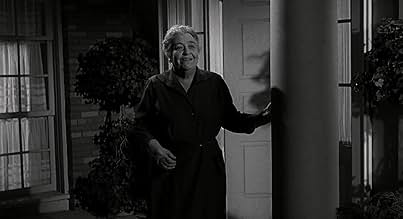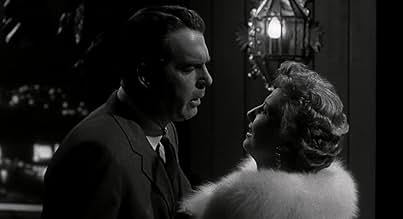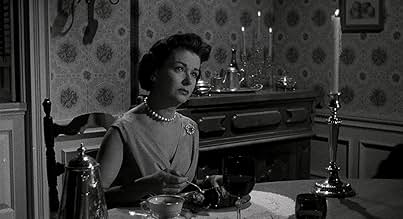Aggiungi una trama nella tua linguaWhen a toy manufacturer feels ignored and unappreciated by his wife and children, he begins to rekindle a past love when a former employee comes back into his life.When a toy manufacturer feels ignored and unappreciated by his wife and children, he begins to rekindle a past love when a former employee comes back into his life.When a toy manufacturer feels ignored and unappreciated by his wife and children, he begins to rekindle a past love when a former employee comes back into his life.
- Regia
- Sceneggiatura
- Star
Recensioni in evidenza
The best part here is that "There's Always Tomorrow" has director Douglas Sirk working in the 1950s, with his best photographer Russell Metty. This means artful shadows, stairways, windows and reflections. Such visuals, especially as they complement the story, are great. There is even a scene with Stanwyck's face shedding tears that are actually reflected raindrops; a technique said to have originated with "In Cold Blood" (1967). Quite possibly, this was done even earlier...
The cast is strangely unimpassioned. MacMurray and Stanwyck lack the level of spark they conveyed in previous collaborations. Perhaps this is the point. MacMurray has become like the toy robot he created. He's "Rex" the walkie-talkie mechanical man. Stanwyck appears to be hesitating an attempted seduction. While not the protagonist, she becomes the most interesting character. Completely and most maddeningly in the dark, Ms. Bennett acts robotically unaware of the threat to her supposedly perfect family life. Shaking things up is suspicious and literate son William Reynolds (as Vinnie).
******* There's Always Tomorrow (1/20/56) Douglas Sirk ~ Fred MacMurray, Barbara Stanwyck, Joan Bennett, William Reynolds
While Sirk's films have often been branded "woman's pictures", "There's Always Tomorrow" is indeed very much a man's picture. It takes a hard and deep look at the role of the male breadwinner and the picture it comes up with is not a pretty one. What we are shown is a man who when young, courted the prettiest girl, married, had children and worked hard to build up a successful business. He is now middle aged and having achieved it all, begins to feel himself taken for granted by his wife and children. His needs are completely neglected. His wife has little interest in him sexually being totally wrapped up in fulfilling the unending needs of their self centered ungrateful children. It's a scenario all too familiar to millions of men. Fred MacMurrays's Clifford Groves has become a robot similar to the one his successful toy manufacturer has created. No wonder that Norma Vale's (Stanwyk) reappearance in his life presents an opportunity to regain his lost dreams. She's an independent career woman, who sees his situation as somewhat idyllic from the outside. But with the usual intelligence of a Stanwyk character, she has no illusions as to a possible future with him. Despite the brief and obligatory conciliatory ending, Clifford Groves' future does not bode well. It should come as no surprise that the film was not well received at the box office.
"There's Always Tomorrow" has many of the hallmarks of Sirk's craftsmanship. The studio refused to grant him his request for the film to be shot in color, despite having provided Universal with some of its highest grossing pictures of the decade. At least his demand for his favorite cameraman Russell Metty was granted. Metty as always, was the perfect partner in realising Sirk's vision. His interior filming in particular is a lesson in cinematography. He had a penchant for shooting characters behind banisters, framed in mirrors and caged behind fences to enhance the sense of their being trapped. MacMurray and Stanwyk are constantly gliding through dark shadow and bright light reflecting the inherent brightness and darkness in their lives.
At this point of writing "There's Always Tomorrow" has not been released in any format and rarely gets a showing on television. It's a gross injustice to an extremely important director and a wonderfully made, moving piece of cinema.
Excellent performances by Stanwyck, MacMurray, and Bennett. This is one of the last movies Stanwyck and MacMurray made together, she was as beautiful in this movie as in any of her 1940's movies. She's timeless and such a wonderful actress. For those of you who really like Fred, and want a real treat... Check out the movies "Miracle of the Bells," and "Suddenly it's Spring!" Fred Mac Murray and Barbara Stanwyck were such underrated actors/actresses of their time. Joan Bennett plays her part so well you understand why the household is the way it is. Great love story, if you can get through the kids!
Just as he's feeling especially insignificant along comes old flame Barbara Stanwyck in her third fine film with MacMurray to fan the sparks of his mid-life crisis into a full-blown blazing passion, to the extent where he has a secret if accidental weekend away with her and quickly comes to contemplate leaving his family for a life of excitement with her. Which way will he turn and what part will his two mortified older children, who in typical Sirkian grand coincidental fashion, learn of his plans, play in his final decision?
Once again, Sirk brings family members to a crisis-point and even if the resolution this time takes a conventional course, still there's real drama in these excellently crafted and written scenes of anything but cosy domesticity. Cynics may make sneering remarks about all this amounting to shallow soap operatics but I think they would be wrong. Post-War Western and especially American society was evolving even against the "I Like Ike" background of greater personal wealth and the growth in consumerism but just under the surface it wasn't all sweetness and light and Sirk was one director who caught that change in attitudes in his mid-50's work.
Once again MacMurray surprised me with the depth and roundedness of his performance as a middle-aged man cornered by society's expectations of him while Stanwyck in one of her last major roles before she, like MacMurray a bit later, turned to TV, is as good as she usually is as the unwitting Eve in Fred's supposed Garden of Eden. Her character of a flamboyant, self-confident, but importantly unmarried career-woman is equally worthy of deeper investigation as MacMurray's worm-turning Mr Suburbia.
Lesser known than other Sirk dramas of the decade it's as good as any of them in my opinion and well worth watching.
Lo sapevi?
- QuizAcclaimed documentary filmmaker Errol Morris named it as one of his 10 favorite films in the 2002 BFI Sight & Sound Poll.
- BlooperNear the end, Vinnie is telling his girlfriend that he was wrong "about Norma and Cliff" in these exact words. But Cliff is his father; he wouldn't refer to his father by his first name.
- Citazioni
Norma Miller Vale: Love is a very reckless thing. Maybe it isn't even a good thing. When you're young and in love, nothing matters except your own satisfaction. The tragic thing about growing older is that you can't be quite as reckless anymore.
- Colonne sonoreBlue Moon
(uncredited)
Written by Richard Rodgers and Lorenz Hart
Played on one of the toys and heard as a theme throughout the film
I più visti
- How long is There's Always Tomorrow?Powered by Alexa
Dettagli
- Data di uscita
- Paese di origine
- Lingua
- Celebre anche come
- Pasión otoñal
- Luoghi delle riprese
- Azienda produttrice
- Vedi altri crediti dell’azienda su IMDbPro
- Tempo di esecuzione1 ora 24 minuti
- Colore
- Proporzioni
- 1.85 : 1



































